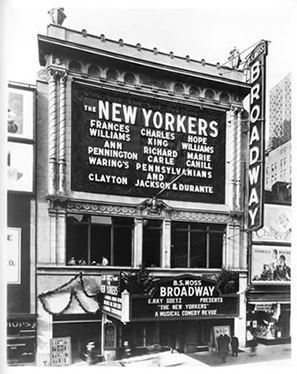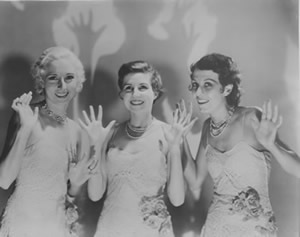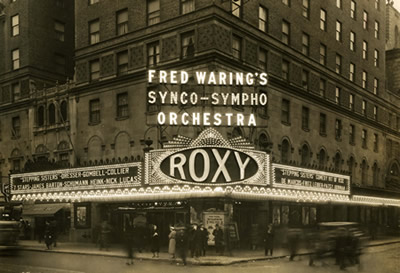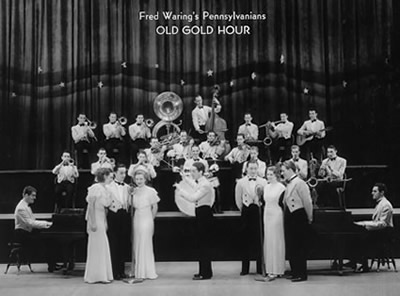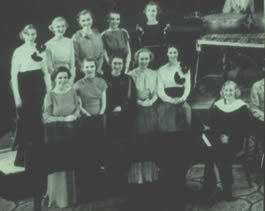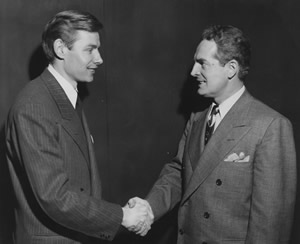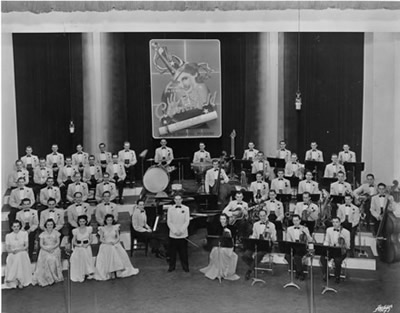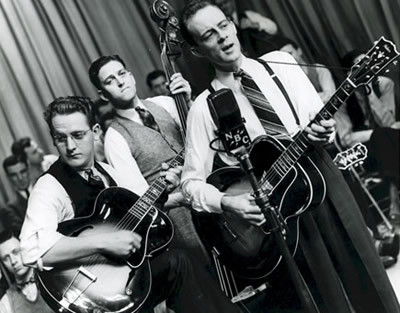From November 1930 through May 1931, the Pennsylvanians were featured in Cole Porter’s Broadway musical revue The New Yorkers. The show was a rousing success—even though it was the Depression, it grossed $76,000 in its first week!
The song "Love For Sale," written by Porter, was featured in The New Yorkers and became a big hit for the group. A trio of girls in the Pennsylvanians called "The Three Girlfriends" performed it.
During the 1930s, the group was at the height of their popularity with hit records and huge crowds lining up at theatres to see them. Fred Waring’s Pennsylvanians’ as they were now known, scored one of their greatest theatrical successes with a stint at New York’s famous Roxy Theatre in 1932. Booked for six weeks, the group of 12-15 musicians expanded to 55 and was held over for an unprecedented 5-month run at the theatre.
By the 1930s, charismatic Fred Waring had become the rock star of his day, exploding with enormous vitality all over the stage, when he went on to conquer radio. Radio made the Waring sound familiar to millions of Americans. Their first network radio program was a weekly half-hour show sponsored by Old Gold Cigarettes. This was followed by the twice-weekly Ford Dealers show from 1934–36.
Waring brought new innovations to the group in these early radio days. He introduced the first vocal swing ensembles including the V-8, Stella and the Fellas, and Babs and her Brothers.
The very first Girls Choir on radio was introduced by Fred Waring. Pianist, singer and arranger Kay Thompson led the Girls Choir. Singing songs such as “I Got Rhythm” on the Ford show. Kay Thompson went on to become famous as the author of the popular children’s book series, “Eloise at the Plaza.” Click to listen to "I Got Rhythm."
Another original featured performer on the Ford show included jazz trumpeter and ‘scat’ singer Johnny “Scat” Davis, performing “The Sheik of Araby.”
Throughout the 1930s, the Pennsylvanians continued performing on radio and in live stage shows. In 1937, they went back to Hollywood to make the film Varsity Show. Besides featuring all the people of the Waring organization, it also starred a handsome rising star, Dick Powell.
From the soundtrack of the movie, the grand finale was conceived and staged by the legendary Busby Berkeley. The song, "Love is on the Air Tonight," features Dick Powell, Rosemary Lane, Poley McClintock, Tom Waring, and the rest of the Pennsylvanians.
Starring in the movie Varsity Show had a positive and negative impact on the Waring organization. Many of the featured performers, including the Lane Sisters, Johnny Davis, and several instrumentalists and arrangers decided to stay in Hollywood instead of touring their way back east with the rest of the group.
But, while filming Varsity Show at Pomona College in California, Waring went to hear a concert by the college’s Glee Club and was very impressed with its student conductor Robert Shaw.
Up to this point, all the Glee Club singing in the Pennsylvanians was done by the instrumentalists. But after seeing Robert Shaw’s impressive conducting of the Pomona College Glee Club, Waring realized that is was time for him to form a professional Glee Club, with trained singers. So, he hired Shaw to help him organize and train a separate Glee Club, changing the sound of the Pennsylvanians forever.
The new Waring sound, becoming the “Gold Age of Choral Music” was created on what would become an award winning radio program, The Chesterfield Pleasure Time Radio Show. The Waring troop went on the air live on June 4, 1939, creating The Chesterfield show every night, five days a week, and all 52 weeks of the year, for the next six years. They performed a 15-minute program from 7:00–7:15 p.m., and after the broadcast they did a 45-minute show for the live studio audience. Then they repeated the whole process at 11:00 p.m. for the west coast broadcast, including doing another “after-show” for the studio audience.
The new and unique sound created on The Chesterfield show was due to the efforts of Robert Shaw and the professional Glee Club as well as by other new people in the group such as arranger Roy Ringwald, singers Patsy Garrett, Donna Dae, and Jane Wilson, who sang that extremely high note at the end of many songs, plus the fantastic guitar playing of Les Paul, as in "St. Louis Blues."
Waring introduced some gimmicks on the Chesterfield Show that became very popular, such as this July 21, 1939, baseball game score announcement.
When radios started to have push buttons to change stations, Waring came up with scenarios that might occur if a listener “surfed” the radio dial.
Another highlight of the Chesterfield radio days was when Waring and arranger Roy Ringwald revived an obscure song from the Civil War era, the "Battle Hymn of the Republic," on June 6, 1942. The song went on to become a Gold Record for the group.
In 1940 a short promotional film, Chesterfield Presents Pleasure Time, was made about the making of the daily radio program.
The Chesterfield show ended in June 1944. After taking some time off, the Pennsylvanians returned to the Roxy Theatre for six weeks and in September of that year they began doing radio programs in the morning, for 30 minutes each day.
